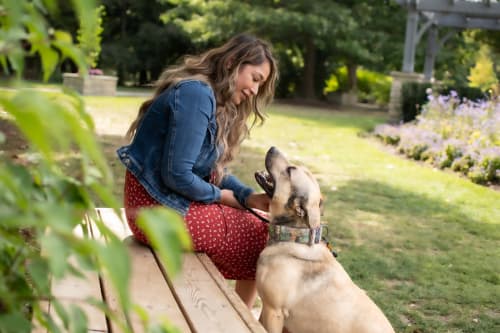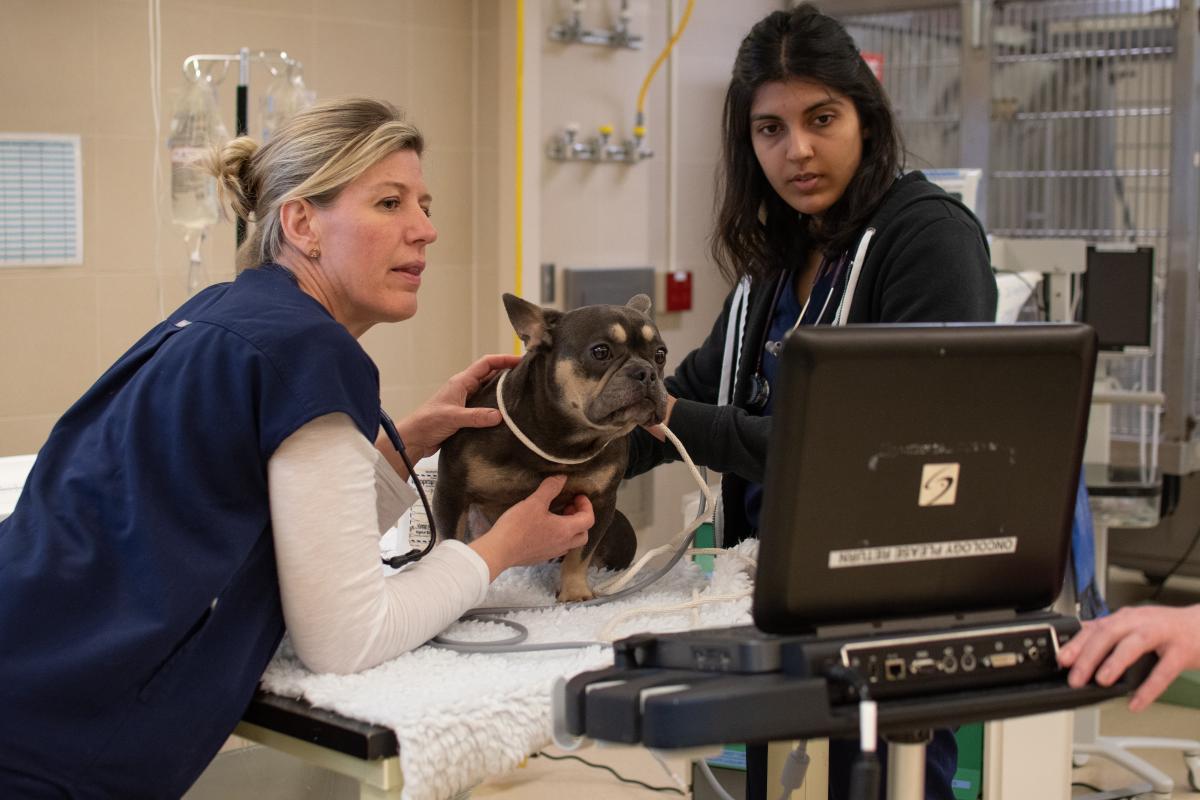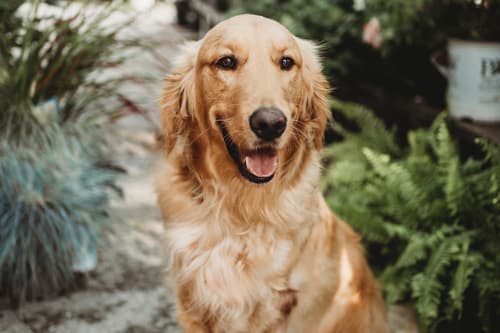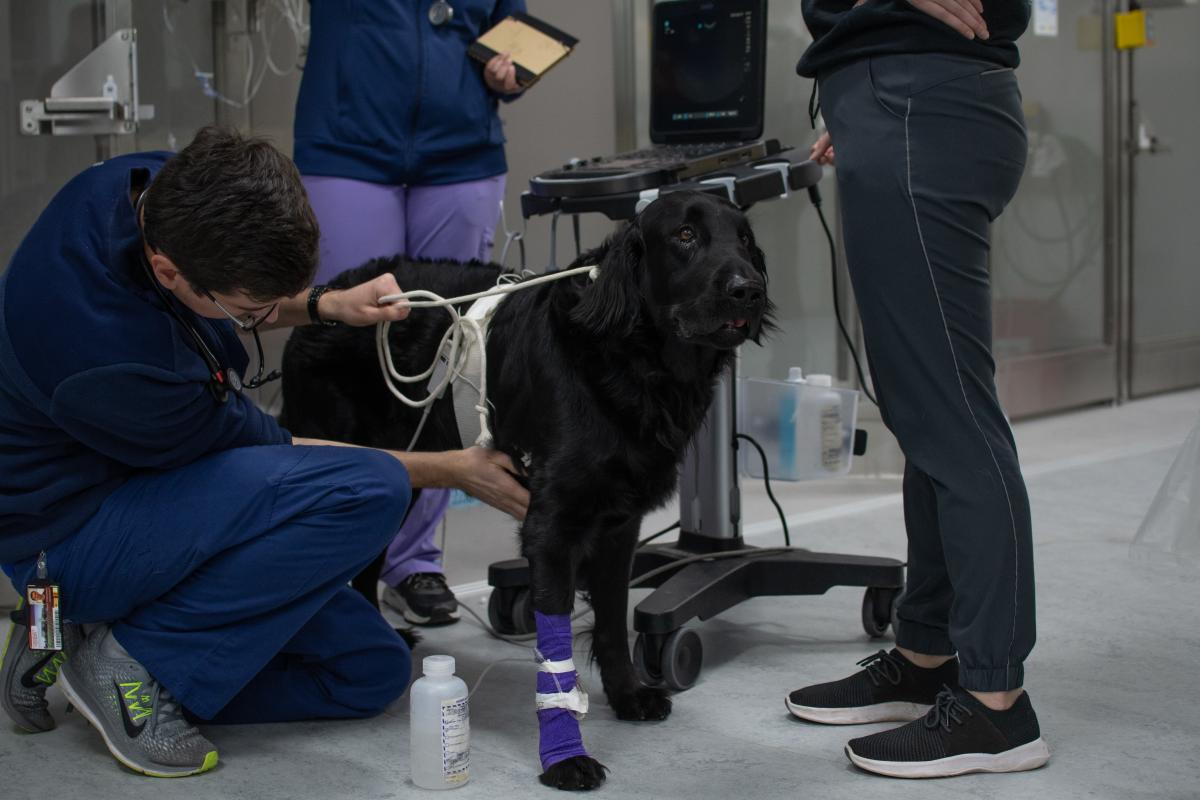When a beloved pet faces a medical crisis, nothing matters more than bringing them back to health. Every day, the Companion Animal Hospital at the Ontario Veterinary College (OVC) treats pets requiring complex, emergency and advanced health care - and the need for these services is growing.
Thanks to extensive renovations (made possible by supporters of OVC Pet Trust), the hospital’s Intensive Care Unit (ICU) is now better equipped to deliver lifesaving and specialty care to more patients while enhancing training opportunities for the next generation of veterinarians in Canada. For OVC’s veterinary care teams, there is nothing more rewarding than seeing a patient who was once critically ill return home to their loving family. These are the stories of some of the first patients treated in the modernized Catherine Bergeron Centre for Urgent and Critical Care. They are stories of hope, resilience, and – ultimately – recovery.
Perseus
 Perseus is a three-year-old Dutch Shepherd who was rushed to OVC’s Emergency and Critical Care Service after accidentally ingesting a potentially lethal dose of naproxen - a common over-the-counter medication - at home in early April. The veterinary team immediately induced vomiting; however, the medication had already started to be absorbed and metabolized. As a lifesaving measure, the team began therapeutic plasma exchange (TPE), which helps remove toxins from the blood circulation by removing the patient’s plasma and replacing it with clean, donor plasma. Unfortunately, Perseus suffered a cardiac arrest during the detoxification procedure but was revived with cardiopulmonary resuscitation (CPR). Due to the combination of toxins in his body and a lack of oxygen to his brain during cardiac arrest, Perseus suffered debilitating neurological complications, blindness, internal bleeding and life-threatening seizures. He spent several weeks in OVC’s Intensive Care Unit, where the team of specialists and nursing staff monitored him carefully and cared for all his body’s needs. Thankfully, his seizures and organ functions improved with time and treatment.
Perseus is a three-year-old Dutch Shepherd who was rushed to OVC’s Emergency and Critical Care Service after accidentally ingesting a potentially lethal dose of naproxen - a common over-the-counter medication - at home in early April. The veterinary team immediately induced vomiting; however, the medication had already started to be absorbed and metabolized. As a lifesaving measure, the team began therapeutic plasma exchange (TPE), which helps remove toxins from the blood circulation by removing the patient’s plasma and replacing it with clean, donor plasma. Unfortunately, Perseus suffered a cardiac arrest during the detoxification procedure but was revived with cardiopulmonary resuscitation (CPR). Due to the combination of toxins in his body and a lack of oxygen to his brain during cardiac arrest, Perseus suffered debilitating neurological complications, blindness, internal bleeding and life-threatening seizures. He spent several weeks in OVC’s Intensive Care Unit, where the team of specialists and nursing staff monitored him carefully and cared for all his body’s needs. Thankfully, his seizures and organ functions improved with time and treatment.
With daily physiotherapy and specialized care, he began to regain strength; however, the medical team could not predict whether Perseus would be able to see or walk independently again. He returned home to his loving owner, Carina Marquez Mewasingh, who continued to provide daily care and physiotherapy. At home, Perseus found comfort in his brother, Milo, as he struggled to adjust to his loss of vision and mobility. With time and assistance during walks, Perseus regained his balance and normal neurological functions. Although he only regained partial vision, Perseus has otherwise made a remarkable recovery and is back to enjoying life.
“I am thankful to the OVC doctors who cared for Perseus,” says Carina. “They took such great care of him. We are also grateful for the support from friends, family and members of our church. I was told by the doctors that it’s a miracle Perseus survived. While he can’t play catch like he used to, he still enjoys chasing Milo and playing with his toys. He’s a very happy dog with so much personality!”
Photo: Perseus and his owner Carina. Photo credit: Katie Duncan.
Mavryk
 Mavryk, a two-year-old French Bulldog, presented to the OVC Emergency and Critical Care Service in April after experiencing a sudden inability to walk properly. He displayed signs of hindlimb incoordination. His neck was stiff, and he was in pain in both his neck and mid-spine region.
Mavryk, a two-year-old French Bulldog, presented to the OVC Emergency and Critical Care Service in April after experiencing a sudden inability to walk properly. He displayed signs of hindlimb incoordination. His neck was stiff, and he was in pain in both his neck and mid-spine region.
Following neurological assessment, Mavryk was diagnosed with suspect disc disease with compression of his spinal cord and nerves, a common problem among bulldogs. Based on Mavryk’s continued ability to support his weight and walk, Mavryk returned home with medication to manage his spinal pain for a period of observation and recovery prior to exploring further diagnostic tests, such as MRI.
Under the loving care of his owner, Nicole Lilley, Mavryk began to show signs of improvement. A neurological assessment the following week showed improvements in both his pain and mobility, and he has since made a full recovery.
“Thanks to the amazing staff, Mavryk is doing well and back to his normal self,” says Nicole. “We just celebrated his third birthday, and I can’t thank them enough.”
Photo: Mavryk is examined by the veterinary care team in OVC's ICU. Photo credit: Katie Duncan.
Brindley
 Brindley, a two-year-old Golden Retriever, was hit by a car in April. He was brought to OVC’s Intensive Care Unit to repair his front legs, which were broken during the accident. Brindley’s surgery was complex and required implants and pins to stabilize his shattered bones. During recovery, Brindley developed a serious infection in his left leg, which required intensive antibiotic treatment and wound management.
Brindley, a two-year-old Golden Retriever, was hit by a car in April. He was brought to OVC’s Intensive Care Unit to repair his front legs, which were broken during the accident. Brindley’s surgery was complex and required implants and pins to stabilize his shattered bones. During recovery, Brindley developed a serious infection in his left leg, which required intensive antibiotic treatment and wound management.
Brindley was discharged after two weeks in the hospital but was soon struggling to walk. X-rays revealed that the stabilizing implant in his left leg had failed, likely due to a bone infection. With the risk of infection spreading quickly, and the damage to his bone from the infection despite local and systemic antibiotics, it was necessary to amputate Brindley’s left leg. Within days of his amputation, Brindley was able to return home. He adapted remarkably well to the amputation, and his right leg fracture has healed completely.
Sadly, Brindley passed away unexpectedly in October. His family is grateful for the extra time they had with their beloved companion. “When Brindley got hit, we were devastated and in shock,” says Brindley’s owner Melanie Porter. “When we learned they had space for him in the ICU it was such a relief. The OVC staff supported both him and us through one of the hardest periods in our lives.”
“From the moment we arrived, the care team was extremely proficient, professional, and compassionate, which in turn calmed our nerves and gave us such solace. Brindley was never just a dog to us; he was a member of our family and our daughters’ best friend. We will miss him immensely and are very thankful that we had five more beautiful months with him, thanks to the team at OVC.”
Photo: Brindley at home. Photo credit: Modest Maven Photography.
Oscar
 Oscar, a one-year-old cat, was referred to OVC’s Neurology Service in January after his owner noticed that he was unable to jump and was walking on his heels, known as plantigrade stance. He also showed signs of exercise-induced fatigue, sitting down after only a few steps. A comprehensive neurological exam was performed, alongside x-rays and consultation with the surgical team to rule out orthopedic conditions.
Oscar, a one-year-old cat, was referred to OVC’s Neurology Service in January after his owner noticed that he was unable to jump and was walking on his heels, known as plantigrade stance. He also showed signs of exercise-induced fatigue, sitting down after only a few steps. A comprehensive neurological exam was performed, alongside x-rays and consultation with the surgical team to rule out orthopedic conditions.
Oscar’s disorder was localized to the peripheral nervous system, outside of the brain and spinal cord. Electromyography, which records electrical activity in muscles, showed spontaneous activity in several muscles, and bloodwork revealed high levels of an enzyme that might indicate myopathy, or a muscle disease. Subsequent muscle biopsies were performed to better understand the nature of Oscar’s myopathy, and the results suggested he may have a degenerative condition.
While awaiting clearance to begin steroid therapy, Oscar suddenly began to improve – running and jumping and seeming more comfortable. His owner, Kaye Martin, agreed to delay steroid treatment and is now monitoring Oscar closely at home, where he is nearly back to his normal self. “We are so very thankful for the team at OVC for taking care of Oscar,” says Kaye. “They were very thorough and explained every step they took in caring for him. They handled him with TLC even during his most “spicy” moments. We knew he was in very good hands.”
Photo: Oscar at home. Photo credit: Kaye Martin.
Maximus
 In November 2022, Maximus, a two-year-old Flat Coated Retriever, developed a cough and a fever. X-rays showed unusual patterns in his left lung and despite receiving antibiotics, his breathing worsened and he lost interest in food. He was admitted to OVC’s Emergency and Critical Care Service for further testing. A repeat x-ray revealed worsening patterns in his lung. He received IV fluids for dehydration and medications to soothe his stomach and reduce inflammation in his lung, while the veterinary team ruled out any heart abnormalities or fluid accumulation that might be contributing to his condition.
In November 2022, Maximus, a two-year-old Flat Coated Retriever, developed a cough and a fever. X-rays showed unusual patterns in his left lung and despite receiving antibiotics, his breathing worsened and he lost interest in food. He was admitted to OVC’s Emergency and Critical Care Service for further testing. A repeat x-ray revealed worsening patterns in his lung. He received IV fluids for dehydration and medications to soothe his stomach and reduce inflammation in his lung, while the veterinary team ruled out any heart abnormalities or fluid accumulation that might be contributing to his condition.
Maximus was diagnosed with pneumonia. His breathing and heart activity were monitored carefully while he received a potent course of antibiotics and other medications to manage his symptoms. With improvement a few days later, Maximus returned home to the care of his concerned owners, Nigel and Sharon Kay. In April, Nigel and Sharon were worried when Maximus again showed similar symptoms. Maximus returned to OVC for testing and hospitalization to manage the illness, a milder recurrence of pneumonia. Thanks to his owners’ quick actions, Maximus received prompt attention and returned home after a short course of treatment.
“We were very relieved when Maximus was referred to OVC by our local vet due to the special respiratory care he required,” says Nigel Kay. “We knew he was in a place where he would receive the best possible care. When he exhibited similar symptoms several months later, we immediately took him back to OVC again knowing that he was in good hands to prevent the pneumonia from progressing to what happened the first time. We are very grateful to the staff at OVC for their expert care and kindness.”
Photo: A veterinarian monitors Maximus' breathing and heart rate in the ICU. Photo credit: Katie Duncan.
This story originally appeared in the Fall 2023/Winter 2024 edition of Best Friends magazine.

